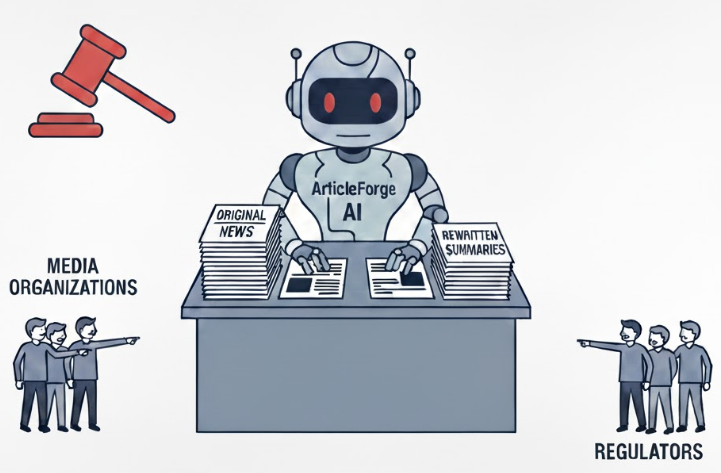Aggregated and Accused: Legal Action Targets Unlicensed AI News Platform
The Challenge
In 2025, ArticleForge, a Canadian AI-driven news aggregation platform, became the subject of a landmark lawsuit filed by several media organizations. The platform had built a large following by compiling news from multiple sources and generating rewritten summaries using artificial intelligence. While the model’s purpose was to enhance efficiency and coverage, the system frequently produced paraphrased content that retained the core of the original reporting without attribution. The company monetized this content through programmatic advertising, gaining revenue that rivaled smaller publishers who had originally created the stories.
The problem was compounded when industry watchdogs discovered that ArticleForge had scraped data from hundreds of news websites without licensing agreements or consent. Some rewritten articles introduced factual distortions, changing the intent of the original pieces. These actions attracted the attention of regulators and resulted in a public backlash from journalists who accused the platform of intellectual property theft and misinformation.
The situation escalated when the Office of the Privacy Commissioner began reviewing whether personal data used in comment sections and social media feeds had been included in AI training datasets. The absence of a legal framework for source usage, coupled with the lack of an ethical oversight process, revealed severe governance gaps. ArticleForge faced the risk of legal damages, advertising boycotts, and permanent suspension from major digital networks.
Our Solution
Our consulting team was retained by ArticleForge’s leadership to manage the legal, ethical, and operational crisis. The immediate priority was to halt all scraping activity and remove any unlicensed or disputed material from public access. We worked with the company’s legal counsel to establish a formal licensing framework that defined the conditions for content use, citation, and revenue sharing. This framework was modeled after Creative Commons principles and aligned with Canadian copyright law.
We also designed a transparency and attribution program to restore public confidence. Each AI-generated article was retrofitted with clear sourcing labels, and an opt-out portal was introduced for publishers who did not wish their content to be used for AI summarization. At the organizational level, a content ethics committee was formed, combining editorial, legal, and technology stakeholders to approve any future automation or data acquisition initiatives.
Finally, we supported the company in negotiating settlements with affected publishers, emphasizing voluntary correction and cooperative reform rather than litigation. ArticleForge implemented a compliance monitoring dashboard to ensure that licensing, data sourcing, and attribution policies were enforced across all operations.
The Value
ArticleForge managed to avoid further lawsuits and rebuilt relationships with major media houses through transparency and reform. By instituting licensing agreements and public accountability measures, the platform repositioned itself as a responsible AI aggregator. The proactive steps reduced the company’s potential legal exposure by more than two hundred and fifty thousand dollars and restored credibility with advertisers. The company also gained recognition from digital rights advocates as an example of ethical adaptation within the fast-evolving field of AI-driven media.
Implementation Roadmap
1. Suspend all unlicensed scraping and aggregation activities.
2. Remove affected AI-generated content and notify original publishers.
3. Create a formal licensing and attribution framework for content reuse.
4. Establish an AI content ethics and governance committee.
5. Deploy ongoing compliance and transparency monitoring tools.


